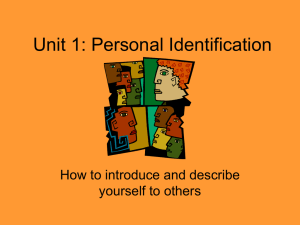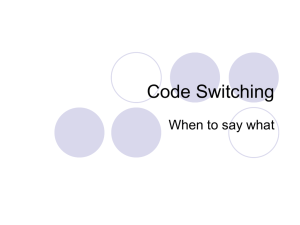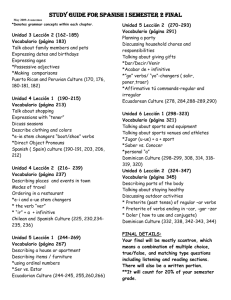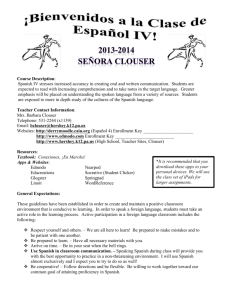Subject Pronouns
advertisement
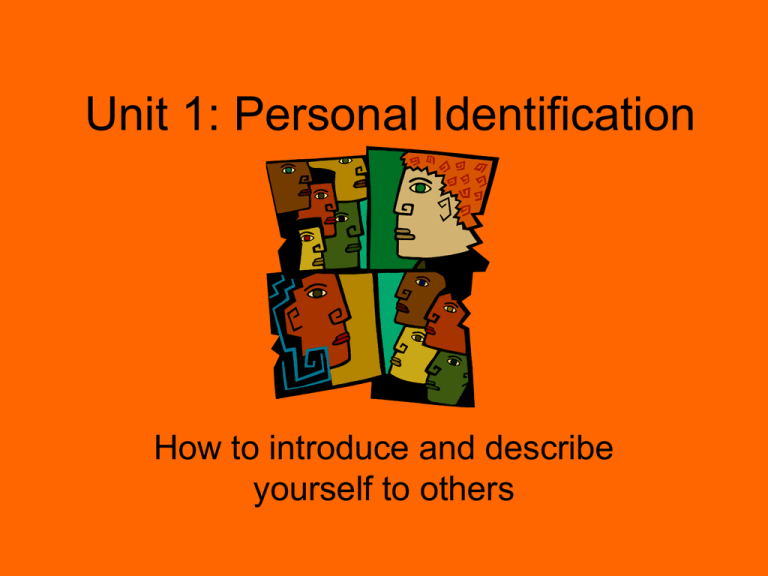
Unit 1: Personal Identification How to introduce and describe yourself to others Vocabulario • I will pass out your vocabulary for this unit. I have given you the definition of these words. • Whenever we begin a new unit or a new topic, I will always begin with the vocabulary for the unit. Many times, I may give you the assignment of looking up and defining the words. • Please keep your vocabulary in the “vocabulario” section of your notebook. • It is your job to study the vocabulary for the unit. It only takes 10 minutes a night- and it will make a difference! The sooner and the better you know your vocabulary, the easier the rest of the unit will be! • Also- be prepared for weekly vocabulary quizzes or some pop quizzes!!!! Vocabulario • Take a minute to look over your words. Go through the list. Make a mental note of the words you already knowand the ones that you are not familiar with, or that you know are difficult to spell. • Flash cards are a perfect way to study those tricky words! Lección 1: Formal Vs. Informal • What does “formal” mean? How about “informal”? • Name some people that you would classify as “informal”…. Now how about “formal”. • In Spanish, there is a formal way to address people- this is called the USTED form. • There is also an informal way to address people- this is called the TÚ form. • Both USTED and TÚ mean “you” in English. • You must decide who the person is that you are speaking with is a formal person or an informal person. • Let’s try a few examples together…. Formal or Informal? 1. A friend of your mother 2. A friend your age 3. A doctor that is 30 years older than you 4. Your father 5. Your brother or sister 6. A police officer 7. A judge 8. Your favorite aunt or uncle 9. Your teacher 10. Your principal Lección 1: Formal Vs. Informal • Now, go back to your vocabulary. • How would you FORMALLY ask somebody “How are you?” • How would you INFORMALLY ask somebody the same question? • How would you FORMALLY ask somebody “How old are you?” And INFORMALLY? • How would you FORMALLY ask somebody “What is your name?” And INFORMALLY? • How would you FORMALLY ask somebody “Where are you from?” And INFORMALLY? Lección 1: Formal Vs. Informal Are there any questions? Lección 2: Subject Pronouns • Subject pronouns take the place of proper nouns in English, so that there is less repetition. The same applies to the Spanish language. Example: Julia likes to eat pizza. Julia eats pizza on Friday. Julia goes to a restaurant. Julia drinks soda too. In the above example, Julia is the proper noun. What can we replace the name Julia with??? Lección 2: Subject Pronouns We can replace the name Julia with the subject pronoun “she.” To make learning subject pronouns a little bit easier, we set them up in a chart. Below are the subject pronouns and their meanings. Yo- I Tú- you Él- He Ella- She Usted- you Nosotros- We Vosotros- you all (informal) Ellos- They (male) Ellas-They (female) Ustedes- You all (formal) The left side of the chart is singular (1 person) and the right side of the chart is plural ( 2+ people) Lección 2: Subject Pronouns Below are a few proper nouns in Spanish and English. Replace the proper noun with the correct subject pronoun. 1. Tú y Fernando 2. Juan 3. Ana y Maria 4. Señor Gomez 5. Julio y Yo 6. You (formal) 7. You (informal) 8. Usted y yo 9. Isabella 10. Juan y Hector Are there any questions?
